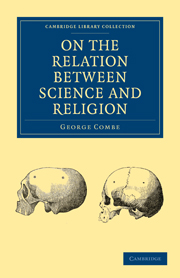Book contents
- Frontmatter
- Contents
- ADVERTISEMENT
- INTRODUCTION
- CHAP. I On the present state of the relation between Science and Religion
- CHAP. II Definition of the words Science and Religion, and Elucidation of the complex character of Religion
- CHAP. III Of Man
- CHAP. IV Of the extent to which Man is able to discover the Ultimate Elements or Essence of the External World
- CHAP. V Of God
- CHAP. VI Can we trace Divine Government in the Phenomena of the Physical and Moral Worlds? And if so, by what means is it maintained and rendered efficient?
- CHAP. VII Historical Evidence that the Divine Government of Nations is Moral
- CHAP. VIII Is this World, such as it now exists, an Institution?—Or is it the Wreck of a better System?
- CHAP. IX Practical Considerations
- CHAP. X Conclusion
- APPENDIX
CHAP. IX - Practical Considerations
Published online by Cambridge University Press: 29 August 2010
- Frontmatter
- Contents
- ADVERTISEMENT
- INTRODUCTION
- CHAP. I On the present state of the relation between Science and Religion
- CHAP. II Definition of the words Science and Religion, and Elucidation of the complex character of Religion
- CHAP. III Of Man
- CHAP. IV Of the extent to which Man is able to discover the Ultimate Elements or Essence of the External World
- CHAP. V Of God
- CHAP. VI Can we trace Divine Government in the Phenomena of the Physical and Moral Worlds? And if so, by what means is it maintained and rendered efficient?
- CHAP. VII Historical Evidence that the Divine Government of Nations is Moral
- CHAP. VIII Is this World, such as it now exists, an Institution?—Or is it the Wreck of a better System?
- CHAP. IX Practical Considerations
- CHAP. X Conclusion
- APPENDIX
Summary
HOW SHOULD WE ACT, IF THE WORLD IS AN INSTITUTION?
If this world is an Institution, and if God is its Author and Governor, it appears to be the duty and interest of man to regard it with reverence, to study its arrangements, and, as far as possible, to act in accordance with the rules which it indicates for the guidance of his conduct. We must cease to be affronted with it because it and our own organism are material; to revolt from it because our bodies and those of the lower animals appear to be constructed on one plan, to run similar courses on earth, and to be adapted by surpassing wisdom, each species to its circumstances, and all to the general laws of Nature. In particular, we must cease to treat with ridicule, contempt, or indifference, the influence of the size and condition of the brain in determining, in this life, the amount and condition of the mental power of individuals; and no longer recoil from the proposition that this organ is the grand instrument by means of which God conducts the moral government of the world. We must approach Nature in the spirit of little children, humble, eager for instruction, and willing to obey. To reach this state of mind, we must lay aside that practical atheism which blinds us to the laws of God's Providence, manifested in Nature, and devote our best energies to discover the Divine Will revealed in that record.
- Type
- Chapter
- Information
- On the Relation Between Science and Religion , pp. 191 - 252Publisher: Cambridge University PressPrint publication year: 2009First published in: 1857

